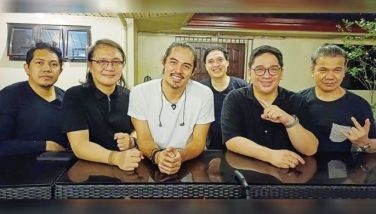Still swingin’ after all these years
July 28, 2002 | 12:00am
 Remember that classic scene in the movie Wayne’s World where the two lead stars, face to face with their revered rock gods for the first time, get down on their knees, bow their heads and chant, "We’re not worthyyyyyyy!!!!?"
Remember that classic scene in the movie Wayne’s World where the two lead stars, face to face with their revered rock gods for the first time, get down on their knees, bow their heads and chant, "We’re not worthyyyyyyy!!!!?"
Well, that could very well be the same sentiment echoed by a tight-knit circle of jazz musicians, aficionados, and critics whose young and fertile ears have been influenced by the sheer depth of one man’s improvisational genius.
Established in their own respective fields, such artists as "world music diva" Grace Nono, jazz guitarist Bob Aves, blues god Jun Lupito, fusion extraordinaires Albert Albert and Reni Angeles, jazz chronicler Richie Quirino, Dr. Nab Cañero, JD Villanueva of Ugoy-Ugoy, Prof. Reyben Maigue of the UP Jazz Ensemble, Mon Guevara of the Executives Band, and folk-rock honcho Noel Cabangon wouldn’t normally kowtow to lesser gods.
But mere mention of one man’s name would be enough to send them… not exactly in a kneeling frenzy, but in a lingering state of musical awe. Their object of reverence? He’s none other than the 81-year-old jazz composer/arranger and bassist Angel Peña.
Although considered a luminary in the local jazz arena, Mang Angel (ang-hel), as he is fondly called, is also equally adept in the classical realm – having held his post as resident bassist of the Honolulu Symphony Orchestra for more than 20 years.
Among his prize-winning compositions are the Igorot Rhapsody for Symphony Orchestra, which won first prize at the National Symphonic Poem Composition Contest in 1960. His jazz compositions have also been performed and recorded in London and West Germany, and have also been included in the album of noted American big band leader Stan Kenton.
In 1981, in commemoration of the 75th anniversary of Filipinos in Hawaii, Peña’s Concerto for Jazz Quartet and Orchestra was given a fitting premiere. A few years later, when he came back to Manila for a short visit, the same composition was played at the CCP.
Based in Honolulu for more than two decades, Mang Angel recently returned to Manila to see the fruition of his still-unfulfilled musical dreams – to write a jazz concerto, to continue educating eager jazz fans, and as always, taking pride in the works of the young jazz lions whom he unwittingly influenced.
While most musicians would show signs of "battle fatigue" by the time they reach the half-century mark, Mang Angel appears younger than his actual age. Although beset by minor vision and depth perception problems, he still talks very fluently –displaying an uncannily sharp memory and attention to detail.
Asked what he was doing in Manila prior to leaving for Honolulu in the late ’60s, Mang Angel, with clockwork precision, instantly replied, "I was playing with the (Manila) Symphony Orchestra and arranging music. They played my composition then, the Concerto for Double Bass and Orchestra at the Philamlife Auditorium. That was Feb. 9, 1969."
It’s not surprising how even today’s big name artists look up to Mang Angel as a doting father figure. At any time, he can mesmerize any group with his amazing stories and anecdotes from decades back. For instance, did you know that in 1939, when he was playing guitar for a Malabon-based big band, musicians then were then being paid one peso per night?
Mang Angel comes from a family of musicians. "My two uncles were both violinists. One of them, Tio Pepe, was a bandleader of a luxury liner to Hong Kong," he recalls.
He started performing overseas around 1953, when he went to Tokyo and performed with the likes of Desdre Roxas, Tony Velarde and Bading Tuazon. "We would also have these jams at DRB in Sta. Mesa around 1958," he adds.
Although basically self-taught, the young Angel immersed himself in theory to a point where he was told that he need not study anymore by the time he enrolled at Centro Escolar in 1953. "I was told then that I could qualify for a Bachelor’s Degree. That necessitated writing an overture, symphonic poems, etc. By then, I was happy because I was making money by playing guitar with a jazz band."
After some more years playing with still another group, the Shanghai Swingmasters, Mang Angel soon made the switch to the upright bass – the instrument he confesses as being his first love. "We were in Tokyo in 1954, playing at the Club Golden Gate, when Cesar Velasco asked me to play bass for him. He even let me use his bass for me to learn! Eventually, I played in his band and after some time went back to Manila to audition for the Manila Symphony in 1955."
Not content with mere playing, Angel soon started his foray in composition. Among his earlier works was Bagbagtulambing, a jazzified version of an Igorot folk song. He explains, "It was one of the rare times that jazz was composed in that manner. Jazz critic Gunther Schuller calls it ‘third stream’ music – neither jazz nor classical. Ramon Tapales, then director of the UP Conservatory of Music, liked it so much that he invited me to teach there."
By the late ’60s, just when he thought he was comfortably swinging back and forth between his jazz and classical roles, Mang Angel thought of leaving the country. "Actually, my leaving then was triggered by incidents of harassment in the clubs. Some of the politicians’ goons would actually ask us to stop the music by putting their guns atop their tables. But I was stubborn and I didn’t stop. That led to quarrels with the club’s manager, and to my resolute conviction to be better off playing abroad," he says.
"So, I left for Honolulu in 1969 and auditioned for the Symphony Orchestra there. By the way, prior to that, I was also playing with (the late great jazz pianist) Bobby Enriquez. He even drove me to my audition," he proudly remembers.
Everything was history from then on. On hindsight, Mang Angel muses, "I’m not a religious person, but I believe we are all endowed with a certain ability. To me, deep in my heart, my musical ability is a gift from God and as my way of reciprocating, I’m giving it back to the listeners. Fortunately, because of my attitude, I didn’t starve. I made money, but not much. The main thing in my life is happiness – a happiness that comes from inside out, rather than from ‘outside in’."
BrandSpace Articles
<
>
- Latest
- Trending
Trending
Latest
Trending
Latest
Recommended































